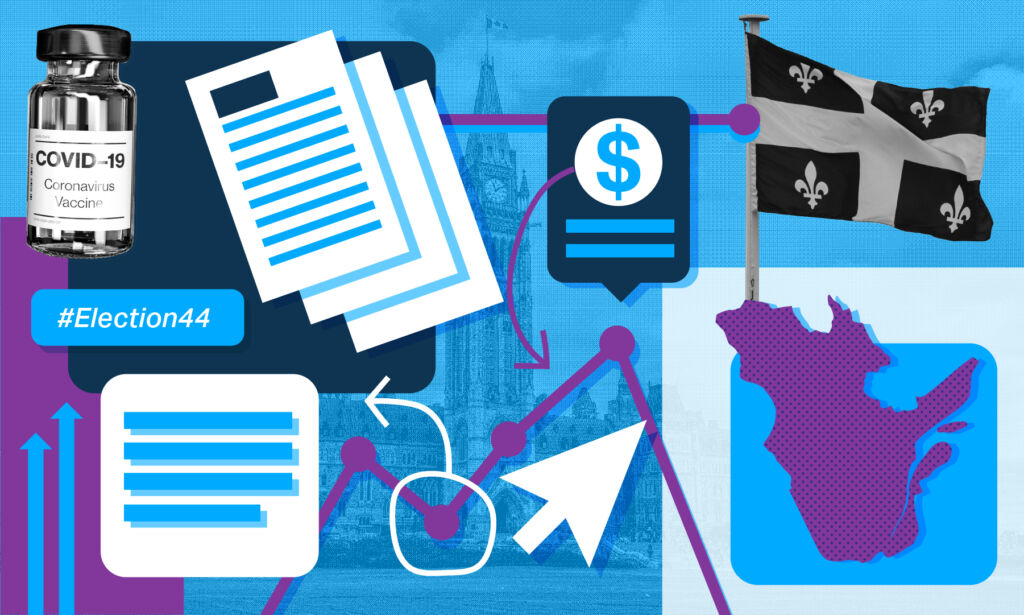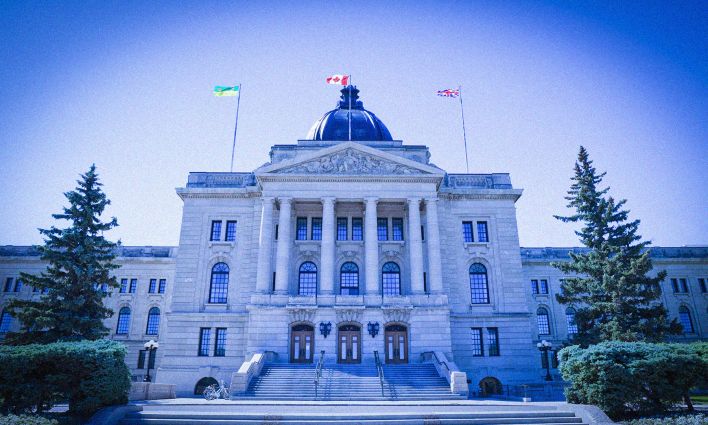Bloc Québécois platforms are different from the other parties since it focuses on Québec politics. As it states since it was founded at the beginning of the 1990s, the Bloc asserts that it “is the only party at the federal level that wishes to influence the State without aspiring to form a government.”
The Bloc has always combined a mix of social democracy and conservatism in its political proposals but nowadays, in line with political trends in Québec, it leans more on conservatism in its nationalist stance.
That transformation is particularly apparent in its stance on the issue of workers’ income. Indeed, even if the Bloc proposes some improvement to Employment Insurance (EI), the party has criticized the Canada Emergency Response Benefit (CERB) during the pandemic and it now campaigns against the Canada Recovery Benefit (CRB) as a way to answer to the labour shortage. The absence in the platform of any mention of “union,” especially when compared to the many references to “entrepreneurs,” also seems to illustrate the shift to a more conservative approach in the economic sphere.
The same can be said regarding climate change. In its platform, the Bloc appears to take seriously the climate crisis but, at the same time, the party has been continuously under fire for its support of the “3e lien” in Québec—a project widely denounced, as this highway development became a symbol of lack of concern with climate urgency.
These mixes messages don’t prevent the Bloc platform from offering many progressive proposals on a range of issues, however.
Covid-19 response
The Bloc suggests a plan for “vaccine autonomy” by developing a pharmaceutical industry that is able to produce vaccines in Canada or Québec instead of only relying on foreign production. To rebuild national capacity is an interesting path, including for environmental reasons. But to limit a health care initiative to support the private sector is not enough. Public facilities should be created and should be part of a strategy to reduce pharmaceutical costs for Canadians—and that strategy needs to include pharmacare.
The Bloc says it wants to reduce the cost of medicine but it pretends that a more aggressive strategy by government in the pharmaceutical field may lead to supply failure. That argument obscures the fact that the medicine prices in Canada, and especially Québec, are among the highest in the world.
The BQ also suggests a “protocol” to respond to the “improvisation, muddle and half-measures” taken by government during the pandemic but doesn’t offer a lot of details. As with all the other parties (the only exception being the Green Party), the Bloc stays away from a COVID-Zero strategy, which would require harsher measures in a brief period to get rid of the virus instead of “learning to live with it.”
The Bloc supports the TRIPS waivers to facilitate vaccine production around the world.
Care economy
The Bloc Québécois’ main message entering the campaign has been to reclaim the hike of health transfers for the provinces. It reminds the provinces to insist on making health transfers cover 35% of provincial health expenses instead of 22%. That increase would add around $30 billion of expenses to the federal budget. The Bloc argues that without these changes, provincial budgets will remain unsustainable, as the Parliamentary Budget Officer (PBO) has concluded many times.
Even if its platform focus is on Québec most of time, the BQ avoids mentioning that the PBO considers three provinces to have a sustainable budget: Nova Scotia, Ontario and … Québec.
That being said, the BQ is right to mention that the drastic reduction of health transfers in the 1990s had a huge impact on provincial finances, and that the historical deal of splitting health expenses 50/50 was unilaterally abandoned a long time ago, letting the provinces deal with the consequences.
The second biggest proposal in the BQ platform focuses on seniors’ income. It proposes to increase old age security to 110$/month, indexed, and to abolish some discriminatory restrictions against people who marry after 60. These measures would add over $7 billion a year to federal government costs.
The Bloc also suggests a tax credit for caregivers that would cost about $650 million a year. But the huge needs regarding long-term care must be answered by a systemic approach. Health issues are a provincial matter but agreements could also be reached when confronted on a central issues. As we have seen in other matters, such as the Régime québécois d’assurance-parentale (RQAP) or probably soon on the childcare issue, compromises can be found.
The Bloc doesn’t hesitate in its platform to present itself as “resolutely feminist” yet it fails to bring that lens to support a more ambitious proposal for long-term care, where we know how much of those care issues are intertwined with women’s well-being. The party does suggest better EI coverage for women who lose their job after parental leave. But the biggest expense suggested by the Bloc in that domain —$50 million—is for women entrepreneurs.
Labour shortage
Most of the proposals about workers in the Bloc platform are linked to the labour shortage, which, once again, reveals a preoccupation on enterprises’ demands—totally ignoring the fact that, in many cases, the shortage is a labour shortage at the wage level the bosses are willing to pay.
The Bloc adopts a demagogic and unproven stance by repetitively condemning the CRB after having criticized the CERB in 2020. On the other hand, the Bloc also proposes to offer coverage to self-employed workers and improved coverage for seasonal workers, two much needed improvements to the EI program in Canada.
It also proposes to increase the transfer for workforce training by $1.4 billion a year.
Climate change
On the climate front, the Bloc Québécois appears, at first glance, to be clear: it insists that the Intergovernmental Planel on Climate Change (IPCC) report shows us how the current situation is an “emergency” and a “crisis” and why every single hydrocarbon project has to be abandoned. It suggests we adopt a “green test” that should apply to every public policy.
Since the beginning of the campaign though, the Bloc has been criticized for its unconditional support of the 3e lien in the Québec region. Furthermore, the Bloc wishes to spend a much more limited amount of federal money ($400 million annually) on ecological transition than on other issues. The Bloc is right when he refers to the economic “transformation” that is needed but it doesn’t give it the financial importance that it deserves.
In what seems to be an answer to the (quite unfair) critiques that often arise regarding equalization transfers to Québec, the Bloc suggests a “green equalization” program that would penalize the provinces responsible for pollution.
The Bloc promotes economic nationalism. It proposes to abandon the hydrogen industry in Canada and to support Hydro-Québec’s “green hydrogen.” It suggests making Québec “North America’s Battery” by investing in local enterprises rather that supporting the “transnational auto industry” of Ontario. That will probably resonate with an older generation of Québecers who witnessed the dismantling of Québec auto industry well before the acceleration of the decline in the neighbouring province. In Québec, the economic comparison with Ontario is omnipresent in François Legault’s government, who obsessively celebrates the fact that Quebec’s debt-to-GDP ratio is now below Ontario’s.
The stance in favour of economic nationalism also elicits contradictory positions: the Bloc criticizes the transnational enterprises and wishes to tighten control of foreign direct investment to retain the province’s production capacities but, at the same time, it says that Québec’s economy is open to the world. It says that business opportunities will come with U.S. President Joe Biden’s recovery plan but says Canada should better protect its industries—including supply management—against free trade agreements.
After all the weaknesses in term of production capacities that we have observed during the pandemic, the Bloc discourse could resonate not only in Québec, but in all of Canada. However, if economic control is the issue, democratizing the economy should be pursued instead of simply trying to determine which national capitalist industry we support against the ones from other nations.
Housing
The Bloc’s progressive side is less ambiguous on the housing issue. The BQ proposes to dedicate 1% of federal revenue to social and community housing. The goal would be to regularize that funding instead of having to negotiate, from time-to-time, agreements on this issue. It also suggests transferring excess federal properties for social housing purposes and creating an acquisition fund that would allow co-operatives and non-profit organizations to take properties out of the rental market and transform it into affordable housing.
The Bloc suggests tackling speculation in the real estate market by imposing a special tax and making permanent special federal pandemic funding to support the homeless beyond the pandemic.
How we pay for it
The Bloc proposes to add $82.3 billion in revenue to the federal budget and $139 billion in new expenses—65% of these expenses would be sent to the provinces as an increase to the health care transfer.
On the revenue side, most of the novelty would come from two sources: recoup the money lost to tax havens and implement a temporary tax on wealth. Except for the temporary part, this new tax proposal is interesting. Like the NDP, the Bloc acknowledges the global trend to ask for a bigger tax contribution from the very wealthy—and especially those who saw their wealth expand dramatically during the pandemic.
It also introduces the principles of a wealth tax that would consider all taxpayer assets instead of only revenue or real estate. Similar to the proposals of Bernie Sanders and Elizabeth Warren in the U.S., it would impose a 3% tax on net wealth over $10 million and a 5% on net wealth over $20 million.
The Bloc would also bring back the web giants taxation proposal, following the example of France, and would seek to increase that tax by $600 million by imposing a 3% tax on their revenue. This money would be redistributed to support the arts, culture and media.
Finally, the platform indicates that the federal government could save $3.5 billion a year by ending the subsidies to the fossil fuel industry and more than $1 billion a year after 2023-2024 by implementing a green equalization plan. That amount would increase every year.
Guillaume Hébert is a socio-economic researcher at IRIS.







